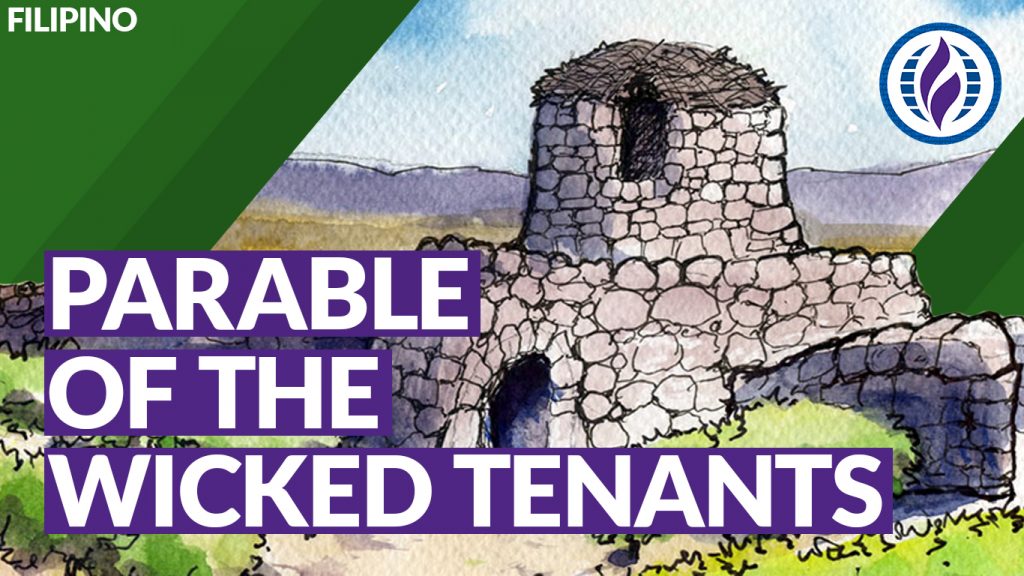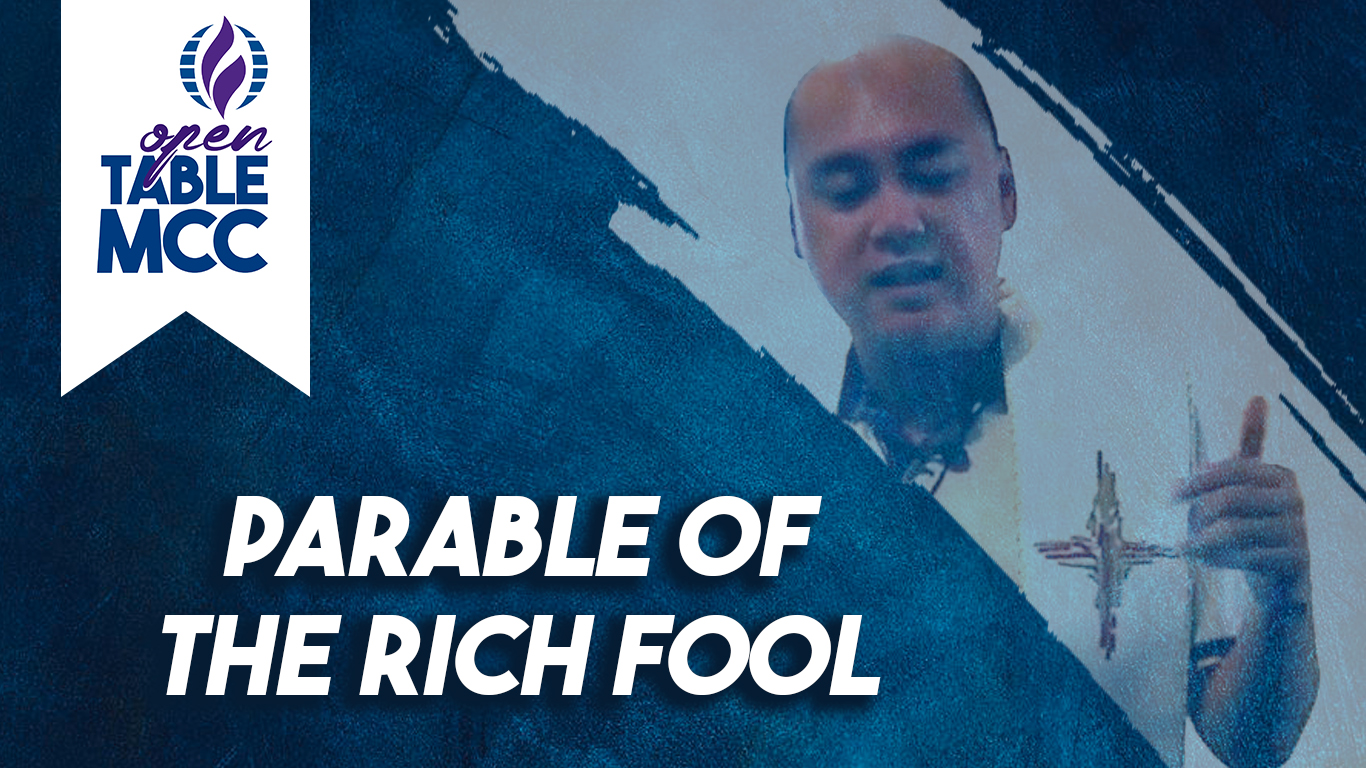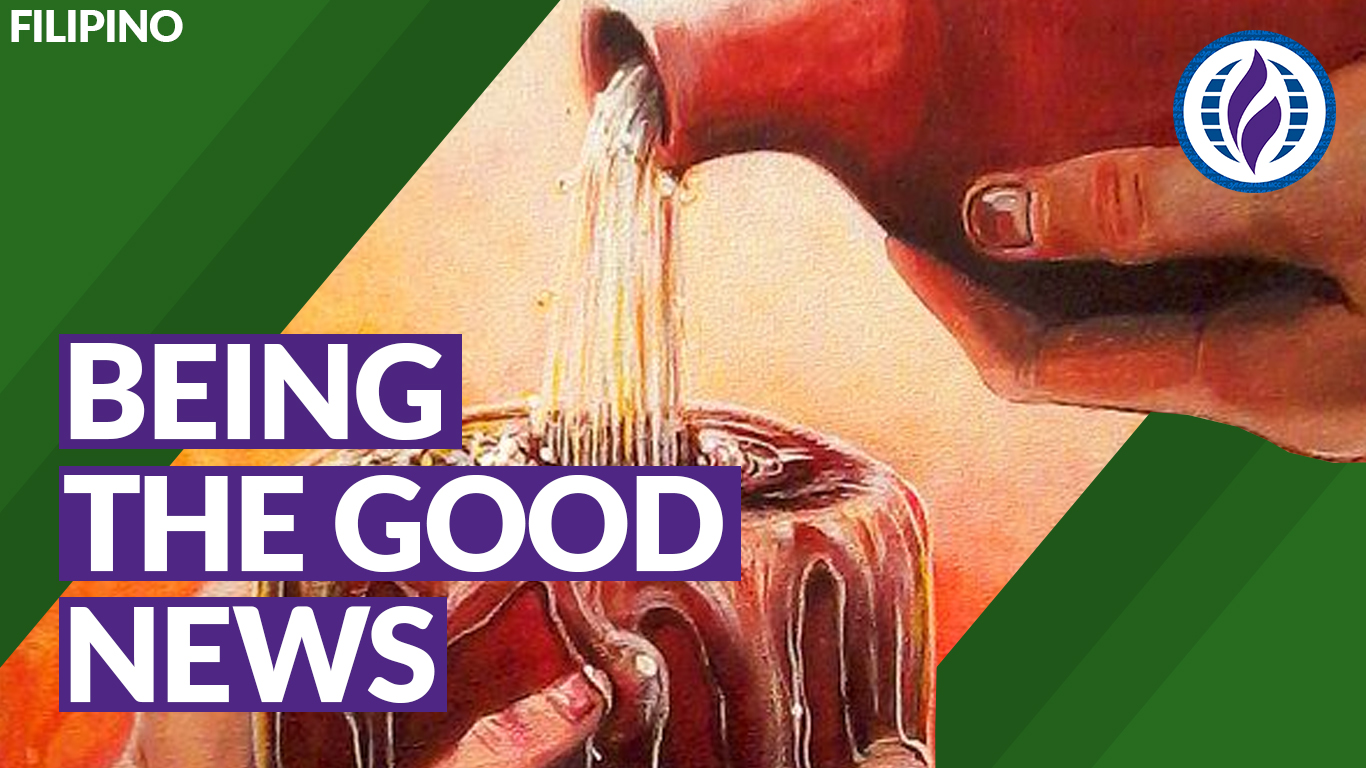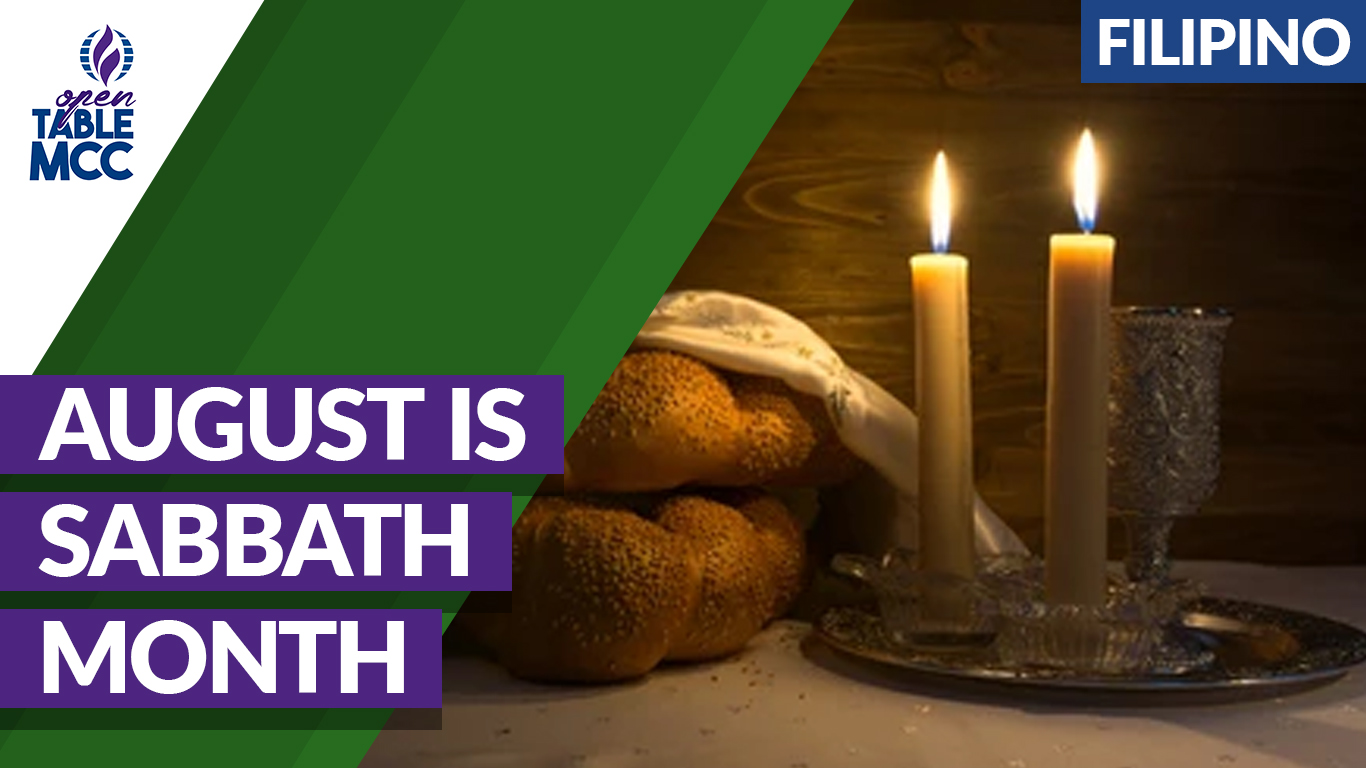“Dinggin ninyo ang isa pang talinghaga: May isang taong pinuno ng sambahayan, na nagtanim ng ubas sa kanyang bukirin, at binakuran niya ang palibot nito. Naglagay siya roon ng isang pisaan ng ubas at nagtayo ng isang toreng bantayan. Pinaupahan niya ang ubasan sa mga magsasaka at siya’y nangibang-bayan. Nang malapit na ang panahon ng pamimitas ng bunga, pinapunta niya ang kanyang mga alipin sa mga magsasaka upang kumuha ng mga bunga para sa kanya. Subalit kinuha ng mga magsasaka ang kanyang mga alipin. Binugbog nila ang isa, pinatay ang iba, at pinagbabato ang isa pa.
Muli siyang nagpadala ng iba pang mga alipin na mas marami pa sa nauna; subalit ganoon din ang ginawa nila sa kanila. Sa kahuli-hulihan ay pinapunta niya sa kanila ang kanyang anak na lalaki. Wika niya, ‘Igagalang nila ang aking anak.’ Subalit nang makita ng mga magsasaka ang anak, sinabi nila sa isa’t isa, ‘Ito ang tagapagmana. Halikayo, patayin natin siya nang makuha natin ang kanyang mana.’ Kaya’t siya’y kinuha nila, itinapon sa labas ng ubasan, at pinatay. Kaya’t pagdating ng may-ari ng ubasan, ano kaya ang kanyang gagawin sa mga magsasakang iyon?”
Scripture Reading
Mateo 21:33-40 (FSV)
Ang hirap actually ng lectionary reading today. How do you apply it to a community of LGBTQ people? ‘Yon ang hermeneutical at interpretative challenge sa kaniya. And so, ang attempt ko today is to simply present the three interpretations. May tatlong interpretations sa kaniya.
Any form of literature is subject to interpretation. It is not humanly possible not to interpret anything. Not even a book. Anything. Because the way someone sees a text, or reads a book, that will always be from the lens of their own life or context. So, psychologically, scientifically speaking, there is no way to say that a particular passage in the bible has only one interpretation. It is not possible. Kaya nga merong forty-two thousand different Christian denominations and churches around the world. Kung isa lang pala ang message niyan, eh ‘di dapat iisa lang ang simbahan. That’s a very clear example of diversity of interpretation.
A particular passage of the Bible can have at least, at the very minimum, seven to nine interpretations. Based on the different methods of interpretation. And even the Jewish people, they have always believed that you can interpret the Torah in so many ways in the Rabbinic tradition. And then, there’s this tradition na tinatawag na Talmudic reading. The Talmud is the Babylonian Jewish interpretation of the Torah. Different interpretations and teachings of different Rabbis, of particular passages of the Torah.
It’s a parable of about farmers and farming. There was an owner of the land who prepared his land, and then had farming tenants na nag-rent ng land niya. Tapos, umalis siya, and then come harvest time, he will just send people to collect the rent or the share of the produce of the land.
The Gospel of Matthew is about approximately either year eighty or year ninety. So that is fifty years or sixty years after the historical Jesus. And Matthew was writing specifically to the Jewish Christians. And also writing in response to the Jewish leaders of his time. No’ng time din kasi ni Matthew, nag-split na ang Christians at ang Jews. Remember that the Christians were Jews and they still attended the synagogue. Uma-attend pa rin sila ng synagogue. But there came a time when nag-mo-move away na. And then there came a time when the Jews, the rabbis, officially removed Christians, or hindi na nila in-allow ang mga identified Christians into the synagogue community. So ‘yan ‘yong context ni Matthew no’ng nagsusulat siya.
Based on the history of Jesus, the context of Jesus, ‘yong isang scholar na nagsasabi nito, si Herzog, sa kaniyang librong “Parables as Subversive Speech”– ang parables ni Jesus in its original form, ang unang message natin today, is not spiritualized. In the original form, it is about the oppressive systems of his time. Kaya, kita n’yo ‘yong story ng parable na ito. It is about a landlord, an absentee landlord, na magpapadala lang ng tao para mangolekta no’ng yaman na hindi niya naman pinagtrabahuhan.
So, Jesus was telling a parable about the injustice. Of the farming communities. So the first, most likely message of the parable is that: the landlord is not God. The landlord is not God in the original parable of Jesus. The landlord is a landlord who takes wealth from the peasant farmers who are “renting” the land. (But might be more true, sa kanila talaga ang land.)
So it is a message against the feudal system of that time. Many of which, many of the landlords in Jesus’ time, in the real sense, many of the pharisees, the sadducees, the religious leaders of the time were also the landlords.
The most probable intention of the parable – yes, it is a critique to the religious leaders, but it is a critique because they are part of the land injustice. The injustice of the land, which is also against the Torah. So that’s the message. And also – it might be that the landlord sent people to collect, but also to do violence to the farming communities, in order to collect. Kasi hanggang ngayon, ‘yan naman nangyayari eh.
Ngayon, ‘yang parable na ‘yan, come year eighty or year ninety, in the context of Matthew. He takes that story and then renders it according to the situation na kini-criticize din ni Matthew ‘yong Jewish rabbis, Jewish leaders, ‘yong paghihiwalay ng Christians at ng Jewish synagogues, in light of the stories and parables of Jesus.
It is inferred that the landlord is God. ‘Yong mga pinadalang taga-kolekta are the prophets. And ‘yong anak na pinadala is Jesus. And then the multiple meanings of that is – the land of Israel and the people of Israel is the vineyard. The farming tenants are the Jewish leaders. God is the landlord.
And so what Matthew was actually saying in two ways is that the land belongs to the Lord. And the people belongs to the Lord. Kasi sa Leviticus, may sinabi si Yahweh: I am giving you the land of promise, but I own it. Thus says the Lord, I own the land. So the landlord, the land, and the people is the Vineyard, in the parable. God is the owner of the land, but you who are leaders of the land, who are merely tenants here, you have done violence against the prophets. You have claimed the land as your own, even if you are just caretakers of the land, and of the people.
At tanong ni Jesus: what do you think will the landlord do to these people? Inferring it to be the religious leaders. Sila ang sumagot. Hindi si Jesus ang nag-declare ng supposedly punishment. Sila ‘yong sumagot. Sabi no’ng religious leaders, temple scribes: ay patayin ‘yan! Papatayin ‘yan ng landlord, at ibibigay ‘yong lupa sa iba. Tapos sumagot si Jesus. And therefore the same will happen. And the land and the people will be given to someone else who will better take care of the land and the people.
The second possible meaning of that parable, according to Matthew na – is not just about the Jewish leaders. It’s about the Christian community. During his time, the audience ni Matthew, sinasabi niya sa mga Christian leaders of the Matthean Community, ito ‘yong nangyari, ito ang mangyayari sa inyo pag hindi n’yo inalagaan ng maayos ang lupa, ang vineyard, which is the church. It’s also an admonition to the Christian leaders of his time.
I-apply natin sa atin na mga LGBT. Kukunin ko ‘yong method ni Matthew, then apply natin sa context natin. So God is the landlord. The land – the vineyard, is the church. The tenants are the religious leaders – me included.
Every now and then, a queer person comes, or is born into the church. Whether out or hindi out. But what do the tenants do? When in the presence, or the possibility of the presence of LGBT in their church, in their vineyard?
They do violence against them.
Or when someone comes out in their church, in their vineyard, in their garden. Anong gagawin ng church?
They will do violence – even just verbal violence against the child.
And countless queer children, queer adults suffer unimaginable psychological damage.
Because religious leaders, the farming tenants – forgot that they are not the landlord, but merely caretakers of the vineyard, and the people. That their primary duty is to take care of the garden, the vineyard, the people. That their mandate is not about strictly enforcing doctrines and laws, but rather, to take care of the people. Especially when – for them – “strange” people suddenly come or arise in the church, like an LGBTQIA+ person or child.
And so the question is: what do you think with the landlord do to these farming tenants? For what they have done to every queer child that has ever been harmed in their vineyard? Ano kaya ang mangyayari dahil sa ginawa nilang harm sa mga queer persons inside their churches?
Ngayon, if you follow the story Jesus said: then it shall be given to those who are able to take care… who are better at taking care of the people, of the land, of the vineyard.
In one interpretation, if they are not able to take care of the queer people, that’s why this vineyard exists. That’s why the garden of Open Table MCC exist, because if they could not take care of queer people there, then perhaps we are the new vineyard to take care of the queer people, and hopefully in the future, including parents of queer children.
We are a vineyard, with a garden of God and I hope we will always be mindful in terms of God holding us accountable for this vineyard, and this garden.
The interpretation can also be a personal one. You can also interpret the parable using Matthew’s, in a very personal, individual way. So God gave you your life. Your life can also be the vineyard. Your life is the vineyard. God gave you your life. God owns your life. And the question is: are you taking care of your life? Are you cultivating your vineyard, so that it may produce fruits. Not only for yourself, but also for others. If God holds you accountable for the vineyard of your life, do you think God will give it away? The things that you have in your life? Or do you think that God will be glad with how you utilize your life in the resources that is given to your life, as an LGBTQIA+ Christian?
And so, I hope that we, in our individual lives, Sari-sarili nating buhay, at sa community na ito ng Open Table MCC. We continue to cultivate the vineyard, the garden. Cultivate one another, cultivate each other’s lives, so that we may bare the fruits of the spirit. Joy, courage, hope, love, compassion, care. I hope we’re able to take care of one another.
It is the vineyard that has been given to us and we are accountable for. Amen.
Podcast: Play in new window | Download
Subscribe: Apple Podcasts | Spotify | RSS



